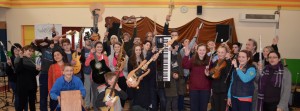A Challenge for the Participatory Arts Sector
“Throughout this time I’ve had a very simple goal, underpinned by an equally simple rationale. My goal has been to get people to create and play music in their everyday lives”
Our friend and cultural adventuror Robert Wells is currently travelling through the Americas.
I’ve worked in the field of participatory arts for many years. Initially I led and assisted on projects, more recently as Programme Leader at the Guildhall School of Music & Drama and Barbican Art Centre, I’ve helped develop policy and practices.
Throughout this time I’ve had a very simple goal, underpinned by an equally simple rationale. My goal has been to get people to create and play music in their everyday lives. It is a simple goal, and one I feel I share with many colleagues. I fervently believe that making music with others, and having a creative outlet, is important for the health of individuals and society. As I said, it is a simple goal, but realising it has proved difficult.
In recent years there have been great successes, a relatively small area of work has undoubtedly blossomed. Virtually every arts centre now has a ‘participation’ department to engage audiences in more meaningful ways, and gradually these are starting to alter the very nature of the thing we call ‘art’. New education programmes have sprung up training people to lead these projects, you can now specialise at undergraduate and postgraduate level, and there is even an option on the BTEC music syllabus exploring ‘community music’. Many of the approaches developed through this work have influenced teaching practices in the classroom, Musical Futures being the most obvious example. In short, a few pioneers have bought about a big change.
Despite all of these successes I don’t feel that my ultimate goal, that of engaging people long term in music making, has been achieved. Sure, many people have discovered that they can play or sing, and start to enjoy doing so during projects, but how many of these people continue after the project has ended? How many of these people engage in music participation as part of their everyday life?
Anyone who has worked in this field will have notable successes. However, if I think of all the projects I’ve worked on, all of the people I’ve taught, I suspect that the majority no longer make music regularly. I’ve certainly got a success rate of less than 50%, so success may not be the correct word to use.
Of those I know who are still engaged in music, most would class themselves as ‘musicians’, and earn at least part of their living from music. This is far from the simple engagement in music, the ‘just for the fun of it’ engagement, that I really have as my goal. If we only produce professional musicians we are leaving a world deplete of interested amateurs, and worse still perpetuating the myth that a few can and the majority can’t. Perhaps I’m expecting too much, however I have a vision in which it is normal for everyone to regularly sing or play together, and I think I share this vision with most of my colleagues.
So I’ve started to think about what else I could do to have a greater effect and I’ve reached a realisation that my overall lack of success is not about me, or my practice, although these are always things worth paying attention to. Rather, I believe we have reached a point where I feel as a sector we must think differently, gain a new focus, and deal with a new problem. Up until now we have been concerned with artistic practice and context, now I believe we must focus our work on society itself.
One example of a problem holding back wider engagement is the problem of time; people have far too little. Our priority, in a society largely interested in rewarding the rich, is to use our time to earn money. For a stark example even the Big Society tsar Lord Nat Wei, reportedly quit because he wanted to use the time he had been volunteering to earn more money.
But it is not that we are all greedy, far from it, it’s just that for most working people ‘free time’ is when you catch up on the things you failed to complete at work. Even within the participatory arts sector I know many people who work such long hours that they rarely if ever participate in the arts themselves. My own move from practitioner to manager has left my musical skills somewhat dusty. If people dedicated to the arts find it hard to make time to participate what hope can we have that regular people will find time?
As I said, time is only one issue, there are countless others. So here is the challenge,
“How as a sector can we bring about the deeper societal change needed to allow more people to regularly engage in music?”
All too often we fail to directly address this issue, and ultimately these problems create impasses that hold back our work. I have some personal thoughts about ways forward, but for now wanted to begin a discussion.
To follow Robert’s blog visit http://culturaladventurer.com/blog/

